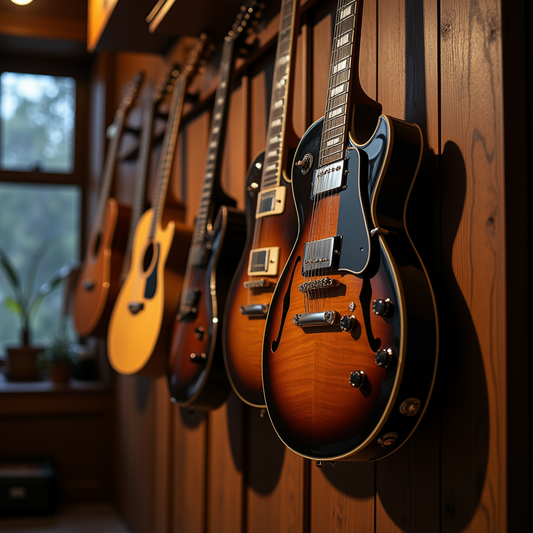Should I Start with Acoustic or Electric Guitar?
Share
Introduction
The choice between starting with an acoustic or electric guitar is no easy feat for beginners. It's like standing at a crossroads, with two enticing paths laid out before you, each leading to a different musical realm. Both types of guitars possess their own alluring qualities, benefits, and difficulties. In this exploration, we will dig deep into the very essence of acoustic and electric guitars to assist you in making a well - considered decision regarding which one could be the optimal starting point for your musical odyssey.
Acoustic Guitar: The Classic Choice
-
Sound and Tone
-
The acoustic guitar emits a sound that is as warm and natural as a gentle breeze on a spring day. Its sound is produced through the vibration of the strings, which then transfer this energy to the body of the guitar, amplifying it acoustically. The tone of an acoustic guitar is a complex tapestry, woven by various factors such as the type of wood used, the size of the body, and the quality of the strings. For instance, a spruce - topped guitar often has a tone that is bright and clear, like the first rays of sunlight piercing through the morning mist. In contrast, a cedar - topped guitar may have a tone that is warmer and mellower, much like a cozy fireplace on a cold winter's night. This rich and organic sound is a siren call for many guitar enthusiasts.
-
As an added advantage, the acoustic guitar offers the freedom to play anywhere without the need for extra amplification equipment. It's like having a portable concert hall at your fingertips. You can take it to the park, and as you strum the strings, the music will blend with the rustling of the leaves and the chirping of the birds. You can go to the beach, and the sound of the guitar will mingle with the crashing of the waves and the seagulls' cries. Or you can simply sit on your porch, and the music will become part of the neighborhood's ambient soundscape. This portability and independence are a huge draw for those who yearn to play music on a whim.
-
-
Learning Curve
-
When embarking on the journey of learning the acoustic guitar, beginners may find it a bit more challenging at the outset. The strings on an acoustic guitar are typically thicker, demanding more finger strength to press down. It's like trying to climb a small hill at the beginning of a long hike. This can be a stumbling block for beginners, especially those with petite hands or less developed finger muscles. However, as the saying goes, "no pain, no gain." As you persevere, your finger strength will grow by leaps and bounds.
-
Learning to play chords on an acoustic guitar can also be more arduous due to the wider necks on some models. It's like trying to navigate a wider river. But in the long run, this can be a blessing in disguise as it compels you to develop better finger placement and accuracy. Just as a skilled archer hones their aim through practice, so will you refine your finger skills on the acoustic guitar.
-
-
Cost
-
Acoustic guitars span a vast price range. You can find a reasonably good beginner - level acoustic guitar at a relatively affordable price. It's like finding a hidden gem in a thrift store. However, if you set your sights on a high - quality, hand - crafted acoustic guitar, the price can skyrocket. But overall, compared to electric guitars, there are more wallet - friendly options available for those just starting their musical journey. According to a market research report, in the entry - level guitar segment, acoustic guitars have a wider price range that caters to different budget levels, with many models priced under $200 that still offer decent sound quality and playability.
-
Electric Guitar: The Modern Alternative
-
Sound and Tone
-
Electric guitars produce a sound that is a world apart from that of acoustic guitars. They depend on pickups to transform the vibration of the strings into an electrical signal, which is then amplified through an amplifier. This mechanism unlocks a vast expanse of tonal possibilities, from the smooth, mellow sounds of jazz that are as silky as a fine velvet curtain, to the high - gain, distorted sounds of heavy metal that are as explosive as a volcanic eruption.
-
You can also employ various effects pedals to further sculpt and modify the sound. For example, a distortion pedal can add a crunchy, overdriven sound, like the sound of a revving engine. A delay pedal can create an ambient, echo - like effect, reminiscent of a sound bouncing off the walls of a vast cathedral. This versatility in sound is a major allure of the electric guitar. Many professional guitarists swear by the electric guitar's ability to create unique and distinct sounds. As renowned guitar virtuoso Steve Vai once said, "The electric guitar is like a sonic palette, and with the right tools, you can paint any sonic picture you want."
-
-
Learning Curve
-
The strings on an electric guitar are usually thinner and more pliable, making it easier for beginners to press down. It's like sailing on calmer waters compared to the sometimes - choppy seas of the acoustic guitar. This can make it more comfortable for beginners when it comes to forming chords. However, electric guitars also demand a different set of skills when it comes to controlling the volume and tone using the knobs on the guitar and the amplifier settings. It's like learning to drive a car with more advanced controls.
-
Another aspect to mull over is that electric guitars are often played with a pick, which can be a new skill to master for some beginners. But once you master this skill, it's like unlocking a new level in a video game. It can open up a whole new world of playing techniques, from fast - paced shredding to delicate picking patterns.
-
-
Cost
-
Electric guitars also exhibit a wide variance in price. While there are some budget - friendly electric guitars on the market, if you desire a high - quality guitar with top - notch pickups and hardware, you may need to dig deeper into your pockets. Additionally, you must also take into account the cost of an amplifier and any effects pedals you might want to use. So, the overall cost of getting started with an electric guitar can be higher in comparison to an acoustic guitar. A study by a music equipment analysis firm showed that on average, a beginner - level electric guitar setup (including the guitar, amplifier, and a basic set of effects pedals) can cost around $$300 -$$500, while a comparable acoustic guitar setup can be had for around $$200 -$$300.
-
Conclusion
In the final analysis, the choice between starting with an acoustic or electric guitar hinges on multiple factors. If you are captivated by the natural, warm sound of the guitar and crave a portable instrument that allows you to play anywhere without the need for additional equipment, the acoustic guitar might be the ideal choice for you. It's like choosing a trusty steed that can take you on adventures far and wide without the need for much baggage. On the other hand, if you are intrigued by exploring a broad spectrum of sounds and tones and don't mind the added cost and equipment requirements, the electric guitar could be an excellent starting point. It's like opting for a high - tech spaceship that offers a multitude of functions but requires more maintenance and resources.
Ultimately, the most crucial element is your passion for music. Whichever guitar you select, it will be the inaugural step in a magnificent musical adventure. So, don't be overly apprehensive about making the "wrong" choice. Just pick up a guitar and let the music flow. As the great guitarist Jimi Hendrix once said, "Music doesn't lie. If there is something to be changed in this world, then it can only happen through music."



